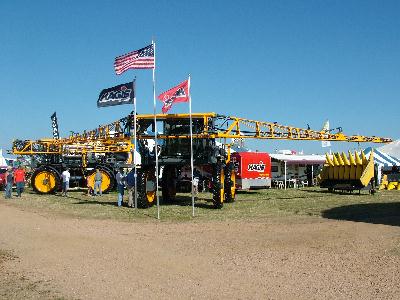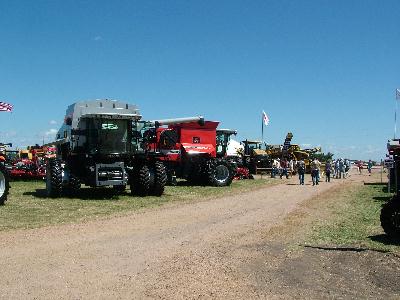In our ongoing quest to make the CobraHead Weeder famous, we occasionally try new trade show venues. Since I thought there had to be a connection between farming and gardening, we exhibited at a show in Minnesota this week called Farmfest.
The show organizers had invited us out as a “green” vendor and we were in a tent with others promoting such things as organic farming, sustainable agriculture, energy issues and land conservation.
While I found the show extremely interesting, we didn’t blow the doors off with tool sales. Most of the farmers appeared to have no interest in gardening or sustainable issues of any type and did not take the time to visit the tent. We sold almost as many tools to our “green” colleagues in our exhibit tent as we did to the whole rest of the crowd, which was very large, over 30,000.
While we knew that big farms did not need or use hand tools, we had hoped there would be interest from the home gardening aspect. Before corporate agriculture exploded, almost every farm had a very large home garden. Today, only a small fraction of farmers garden and they grow almost nothing that they can consume themselves. Home gardening is enjoying a renaissance in the US, but we didn’t see that upsurge in “grow your own” in this audience.
The show solidified my perception that big farmers are not gardeners at all, but heavy equipment operators in a chemical factory. The farms around the site in Morgan, Minnesota were a testament to that. I thought I had seen some big farms in my frequent travels though central Illinois, but these were bigger. We learned at the show that many farmers in the area were cultivating over 10,000 acres. The fields were huge monolithic expanses of either corn or soybeans and almost nothing else. The gently rolling terrain of southwestern Minnesota lends itself perfectly to the big equipment of corporate agriculture. I kept thinking, “what an ecological disaster!” Nothing for miles around but two crops of genetically engineered mutants fed and kept weed and pest free on a diet of chemical concoctions.
Our whole tent was mostly ignored by the crowd. While I had good conversations with several farmers, I had a feeling that a lot who walked by us looked at the tent with some disdain. I don’t mean toward us as garden tool vendors, but more of a kind of smugness (or denial) that there is anything they need to know about the sustainable and organic movement in agriculture other than it is bad for their business. I think some know they are trapped in a system controlled by the big chemical, genetic engineering and equipment producers, and that making any changes could be extremely perilous financially, while others just didn’t care. Hey, corn is $7 a bushel with futures over $8, what’s to worry?
So our foray into the land of the big boys did not yield the return on investment we had hoped for. For now, when we try to sell to farmers, it will be mostly to the little CSA and market growers who understand the connectedness of it all and wouldn’t dream of killing their weeds on top of a high-wheeled sprayer with boom wands reaching out 45 feet on either side of the cab.
Now I’m going outside to try out my new Cobrahead!


